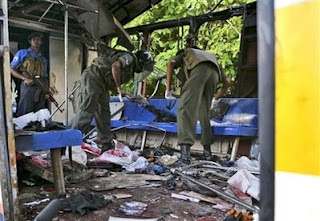I was happy to read that yesterday the US Ambassador to Sri Lanka, the Hon. Robert Blake, has asked the leader of the LTTE, Velupillai Prabhakaran, to give up his demand for a separate Tamil state. He said he thinks that “95% of them (Tamils) support a solution within the framework of a united Sri Lanka.” Mr. Blake said giving up the idea of a separate state would give Prabhakaran "lots of credibility to respond to lots of skepticism here in the South (Sri Lanka) that the LTTE would never negotiate with the government." He also said, "I always remind people who are visiting from US that Sinhalese, Tamils and Muslims lived together and continue to live peacefully together. Tamils are living in Colombo peacefully with their Sinhalese and Muslim friends. So there is no ethnic conflict here. And certainly the government is defending itself against terrorism.”
I would like to note for the record that the present mayor of Colombo is a Muslim, and the Deputy Mayor is a Tamil. There are also several members of the President’s cabinet who are Tamil (now, of course, there are two less since Foreign Minister Kadiragamar and Highways Minister Fernandopulle were brutally assassinated by the LTTE – one by a sniper, the other by a suicide bomber). The newly-elected Chief Minister of the Eastern Province, recently liberated from the LTTE, is also a Tamil. How’s that for proving the Ambassador right?
I completely agree with Mr. Blake’s assessment of the conflict in Sri Lanka, and I applaud him for speaking with such practical, good sense about a tragic, messy situation that simply needs to end – ASAP.
I met Mr. Blake during a trip to Sri Lanka last year. I paid a call on him at his office in the Embassy, and I found him to be a kind and knowledgeable gentleman. At the time I felt proud that we Americans had such a committed, compassionate individual representing our country in the most important posting in troubled Sri Lanka. We have exchanged e-mails a time or two since my return to California. I was just about to send him another one – congratulating him on his statement – when I saw the retort written yesterday by Attorney Bruce Fein, the paid mercenary Washington lobbyist employed by Tamils for Justice (please read “Front Organization for the Banned LTTE Terrorists”).
How can this Bruce Fein, a Beltway prostitute who accepts blood money from the LTTE ($100,000 per month retainer, I’m told), get a good night’s sleep doing and saying what he does? I not only found his remarks to be glib and arrogant to the extreme (using stuck-up phrases for the Ambassador’s remarks, like “owlish certainty which earmarks the glitterati” and “his opulent ambassadorial milieu” – puleeeze…!), but his suggestion that the Ambassador hold a referendum to prove his 95% figure is not only silly, but irresponsible.
Dangerous, duplicitous, greedy Mr. Bruce Fein (no, I don’t like him) thinks Sri Lanka should hold a referendum to determine whether or not the Tamils want their own independent state. Does he think the 100,000 Tamils still living up in the LTTE-occupied north (last census in 1984 said there were 600,000 registered, but an estimated 500,000 have either gone south or emigrated to other countries – an embarrassment for Prabhakaran, who wouldn’t want a counted vote anyway) warrant an independent state – carved out of a small island country? The Tamil population accounts for 12% of the total, so that means there are 2,300,000 Tamils living in the South (not counting the 100,000 up north). Does he think all these people are all going to leave their homes and businesses behind (they have been living peacefully in Colombo and elsewhere for centuries) and simply move up to Eelam, the new motherland, Prabhakaran’s Paradise on the Peninsula?
Get real, Bruce Fein; what do you know? You’ve never even been to Sri Lanka – all of your information is second or third-hand! Nobody’s going to move up north and give up everything they have just to live in some fantasy Tamil-land. The referendum’s results in favor of a unified Sri Lanka would not only embarrass your clients, the LTTE and its Parasite Prabhakaran, but it would be downright patronizing of the intelligent, highly-cultured Tamil citizens of the island who are “Sri Lankan” first.
Thank you, Ambassador Blake, for your distinguished service to two countries.
Respectfully,
Stephen Long
Los Angeles, California


















